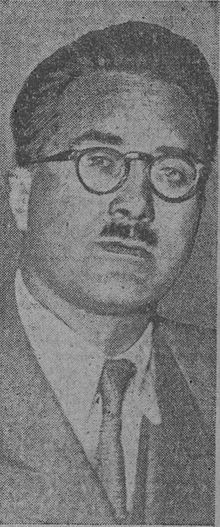François de Menthon
François de Menthon (born January 8, 1900 in Montmirey-la-Ville , Jura department , France; † June 2, 1984 in Menthon-Saint-Bernard , Haute-Savoie department ) was a French politician , lawyer and French chief prosecutor at the Nuremberg trial 1945/46 .
Life
At the age of 17, Menthon joined the Action catholique de la jeunesse française (ACJF, Catholic Action of French Youth) at the beginning of his law studies in Dijon . From 1927 to 1930 he was president of the Catholic youth movement and founded the Jeunesse ouvrière chrétienne . Admitted to the bar, Menthon returned to the Chair of Political Economy at the University of Lyon as Professor of Law . His focus was on labor law . During the Third Republic he was a member of the Republican Democratic Party.
Resistance
As the father of six children, Menthon was drafted into the army with the rank of captain at the beginning of the Second World War , seriously wounded on June 18, 1940 and taken prisoner , but managed to escape. On several visits from Jean Moulin he received him in the castle Menthon-Saint-Bernard . In November 1940 in the Christian Democratic milieu of Annecy , he created the first Liberté resistance movement together with Pierre-Henri Teitgen , René Courtin , René Capitant and Paul Coste-Floret . In November 1942, Liberté decided together with Henri Frenay's resistance group Mouvement de Liberation nationale to found the joint resistance group Combat . Menthon became the editor of the secret newspaper of the same name, the first two editions of which were printed in Annecy, the following in Marseille . On the way back to Annecy, Menthon was arrested in Baumette, transported to Vichy for interrogation , which was carried out by a low-motivated officer and which ended with his release.
Jean Moulin, de Gaulle's tireless envoy, formed a national committee of experts in April under the name Comité général d'études (CGE, general committee for studies), to which Menthon belonged under the code name Tertius . After Menthon had not hidden his fundamental aversion to Vichy's politics, he was forced out of his professorship in 1942 and went underground . In 1943 Menthon joined General de Gaulle in London and later followed him to Algiers , where he served as Justice Commissioner of the Comité Français de la Liberation Nationale (CFLN) from September 4, 1943 to September 10, 1944 .
After the liberation of France, Menthon was Minister of Justice in de Gaulle's first provisional government in Paris from September 10, 1944 to May 8, 1945 . He also served as Minister of Justice in the following government until November 21. In this function he headed the Commission d'Épuration (= purification commission) of the judiciary, police and administration of collaborators and followers of the Vichy regime and the preparations for the trial of the aged Marshal Philippe Pétain . At times he was criticized by his students for the massive purge.
In 1946, de Gaulle nominated Menthon as the French chief prosecutor before the International Military Tribunal at the Nuremberg Trials . He gave the following definition of crimes against humanity: “ Crimes against the demand to be human, motivated by an ideology that is a crime against the spirit, with the aim of throwing humanity back onto barbarism. "
Political work
From 1946 to 1958, as a founding member of the Mouvement républicain populaire (MRP), he was a member of the Savoie constituency in the French National Assembly . From June 24 to December 16, 1946, he served as Minister of Economics in the Georges Bidault cabinet . Between 1952 and 1954 he was President of the Consultative Assembly of the Council of Europe . In this capacity he presented the first stars and stripes of this European community.
After the establishment of the Fifth Republic , which de Gaulle tailored completely to his person through his referendum , Menthon switched back to teaching at the University of Nancy . From 1945 to 1977 he was active as mayor of his municipality of Menthon-Saint-Bernard .
Menthon also founded the Jeunesse catholique ouvrière (= Catholic working-class youth) movement. His son Olivier de Menthon explained it this way: " He appreciated that the role of Catholics is to participate in the evolution of society ."
family
He had six sons with his wife Nicole:
- Bernard, a farmer in the Cher department , who died in 2000;
- Jean, finance inspector in Paris,
- Jacques, deceased
- Étienne, winemaker in the Vaucluse department ,
- Olivier, Lord of the Castle, MP , Member of the General Council and Mayor of Menthon-Saint-Bernard,
- Sixte, teacher in Paris
Works
- François de Menthon: Draft Federal Constitution of the United States of Europe , June 1948
literature
- François Comte de Menthon , in: Internationales Biographisches Archiv 13/1984 from March 19, 1984, in the Munzinger archive ( beginning of article freely available)
Web links
- Literature by and about François de Menthon in the catalog of the German National Library
- Biography (french)
Individual evidence
| predecessor | Office | successor |
|---|---|---|
| Maurice Gabolde |
Minister of Justice of France September 10, 1944 - May 30, 1945 |
Pierre-Henri Teitgen |
| personal data | |
|---|---|
| SURNAME | Menthon, François de |
| BRIEF DESCRIPTION | French politician (MRP), member of the National Assembly, MEP, lawyer and French chief prosecutor at the Nuremberg Trial in 1945/46 |
| DATE OF BIRTH | January 8, 1900 |
| PLACE OF BIRTH | Montmirey-la-Ville , Jura department |
| DATE OF DEATH | 2nd June 1984 |
| Place of death | Annecy , Haute-Savoie department |
